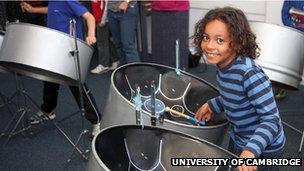Group music sessions 'may boost empathy in children'
- Published

Playing or singing in a group may improve children's capacity to recognise emotion say researchers
Regularly playing music in groups may improve children's ability to empathise with others, suggests a study.
Researchers from Cambridge University compared empathy skills in children who played weekly music-based games for a year with those who did not.
The musical group scored higher in end-of-year tests of how well they recognised other people's emotions.
Lead author Tal-Chen Rabinowitch said: "Musical interaction may enhance a capacity for emotional empathy."
The researchers, from the university's Centre for Music and Science, randomly divided a total of 52 children, aged eight to 11, into three groups.
Once a week one group played a variety of music-based games designed to emphasise the qualities that the researchers believed would promote empathy.
Some of the children played musical instruments they were already learning, others used percussion, clapped or sang.
In particular the researchers encouraged children to copy each other's movements and imitate musical phrases. They also used rhythm to help the children align and adjust their playing to make synchronised music.
Another group played a similar series of drama games without the music. A third group did not take part in either activity.
The researchers tested and compared the empathy skills of all three groups at the beginning and end of the year.
'Mutual honesty'
The tests included a questionnaire and measurements of the children's ability to match and remember the facial expressions of actors in short videos.
Children in the music group performed far more strongly than either of the control groups in the questionnaire and in the emotional-memory test.
The researchers believe the difference stems from musical activities which allow the children to experience what they describe as "shared intentionality" and "mutual honesty" - an understanding of each other's intentions through a common aim and experience.
They suggest that similar cognitive processes may apply to playing music together and developing empathy.
They propose that music-group sessions could be a useful way for schools to improve children's capacity to recognise and consider other people's emotions.
Ms Rabinowitch told BBC News: "Music might be a tool, a really nice welcoming medium for enhancing the mechanism for empathy in children.
The researchers admit their results are not definitely conclusive but say that they appear to back their initial predictions of a link between musical group playing and the development of empathy.
They plan to try to replicate the results on a larger cohort of children.
- Published14 May 2012
- Published12 May 2012
- Published9 May 2012
- Published2 March 2012